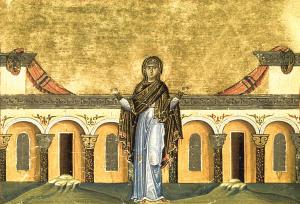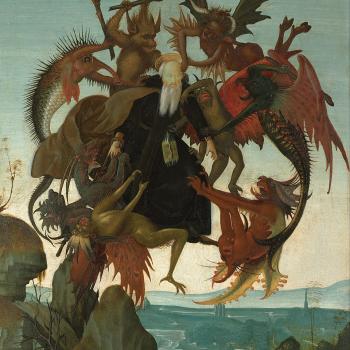
Source: Menologion of Basil II / WikimediaCommons
The Christian way is the way of love. Love is not boastful, it is not proud; it desires good for all. It will not look for excuses to judge others: rather, it will be saddened by our own faults and blemishes, our own imperfections at love. Thus, Amma Syncletica, speaking to her community in the desert, gives advice which all should follow:
She [Syncletica] also said, ‘Imitate the publican, and you will not be condemned with the Pharisee. Choose the meekness of Moses and you will find your heart which is a rock changed into a spring of water.’[1]
Amma Syncletica references the famous parable of the tax collector and the Pharisee:
He also told this parable to some who trusted in themselves that they were righteous and despised others: “Two men went up into the temple to pray, one a Pharisee and the other a tax collector. The Pharisee stood and prayed thus with himself, `God, I thank thee that I am not like other men, extortioners, unjust, adulterers, or even like this tax collector. I fast twice a week, I give tithes of all that I get.’ But the tax collector, standing far off, would not even lift up his eyes to heaven, but beat his breast, saying, `God, be merciful to me a sinner!’ I tell you, this man went down to his house justified rather than the other; for every one who exalts himself will be humbled, but he who humbles himself will be exalted” (Lk. 18:9-14 RSV).
The humble tax collector was concerned with his own failings, with his own unjust actions towards others due to his imperfect love. And yet, this was inspired because he still had love. A lover who loves will bemoan their weakness in love: they will desire to love more, to love greater, to be truly living and acting out of love. Thus, the publican was justified because he understood his failing and desired to be otherwise since he already had an aspect of that greatness in him: he desired God, and in that desire, his love was inflamed, allowing him to change himself and become justified.
The Pharisee, who should not be seen as a representative of all Pharisees, was a man who liked to demonstrate his own apparent righteousness to all. To make himself look great, he had to belittle others. In his lack of humility, he lacked love, and so he judged all others according to their appearance, justifying himself by comparing himself to others, thinking they were his moral inferior. Through his judgment of others, he excused himself: I am better than they, but because of his hardness of heart, because of his desire to belittle and destroy others, he turned himself away from love, and so away from God: how can he be justified? His pride got in his way: his pride hindered his love, and so his pride hindered his right relationship with God.
Pride gets in the way of love, and therefore, in the way of our salvation. If love covers a multitude of sins, we cannot be justified in and through our pride, because pride will not allow us to love others as they should be loved. Pride will not even allow us to see ourselves as we truly are. We will think all things are fine with us: it is everyone else who has a problem. But, to be sure, there are four ways, mentioned by St. Anthony of Padua, in which pride presents itself, each of which we can see mentioned in the parable:
Let us first note that, according to the Gloss, there are four kinds of swelling pride: when someone attributes to himself the good that he has; or, if he acknowledges that it is given by God, he thinks that this is due to his own merits; or, he boasts of having what he does not, in fact, have; or, despising others, he wishes it so seem as if he alone has what he has – as the saying goes:
“Falsely, a credit over all to claim
they blow their trumpets, puff their own good name.”[2]
The Pharisee in the story thought himself to be great, and that this greatness was something which was his by nature and by right: by nature, therefore, his goodness is something which is his, and by right, because he fasted and gave tithes, therefore assuming whatever extra goodness he had, it was because God has rewarded him for his actions. But he was not just. He was not so good, so that he was boasting in a greatness which he does not have, a boast which he used then to compare himself to a tax collector who he despised.
We, too, are quick to lift ourselves up, and in doing so, compare ourselves to others, finding those who we think are worse off from us so as to feel justified in what we do. If we fast, if we give to charity, if we go to church, if we protest some evil in the world, we think we have proven our character and should be reckoned not only as one of the just but one of the greats. This spirit is far from what we should have, the spirit of Jesus, which is a spirit of love. We must not seek after our own greatness but the good of others:
Let each of you look not only to his own interests, but also to the interests of others. Have this mind among yourselves, which was in Christ Jesus, who, though he was in the form of God, did not count equality with God a thing to be grasped, but emptied himself, taking the form of a servant, being born in the likeness of men (Philip. 2:5-7 RSV).
Similarly, therefore, Syncletica said we should examine and follow the way of Moses: he was great because of his humility; he followed external sacrifices with internal ones, those of the heart, so that he could fight for the people of Israel, fighting for their benefit, despite however they would go astray. Instead of judging them, he pleaded for them, for forgiveness, which God in his just love, was willing to give, so that they did not perish but rather, found themselves on a journey towards the promised land where they were to receive the bounty of God’s gifts. It was a difficult journey, full of hardships, but as a people they were able to persevere: Moses was able to lead them and receive the blessings of God for them because he mediated for them with humble love. And if we truly follow Moses, we will see that our deadened hearts will become alive, that what was hard as stone will beat once again, filled with the living water of the Spirit which will nourish us in eternity if we but look to others as those we should lift up and mediate for as well.
Thus, we must stop looking to ourselves, trying to lift ourselves up over others. We must stop looking at others, seeking to lower them in relation to what we think about ourselves and our own merits. Rather, we must imitate the tax collector who in his humility found justification, for this alone will allow our heart to truly love others and through that love come to know God because God is love.
[1] Sayings of the Desert Fathers. Trans. Benedicta Ward (Kalamazoo, MI: Cistercian Publications, 1984), 233.
[2] Saint Anthony of Padua, Sermons for Sundays and Feasts: Volume II. Trans. Paul Spilsbury (Padua: Edizioni Messaggero Padova, 2007), 272-3.
Stay in touch! Like A Little Bit of Nothing on Facebook













